
October 1, 2024
The teach-in happened in response to a call for a national day of action for Lebanon.
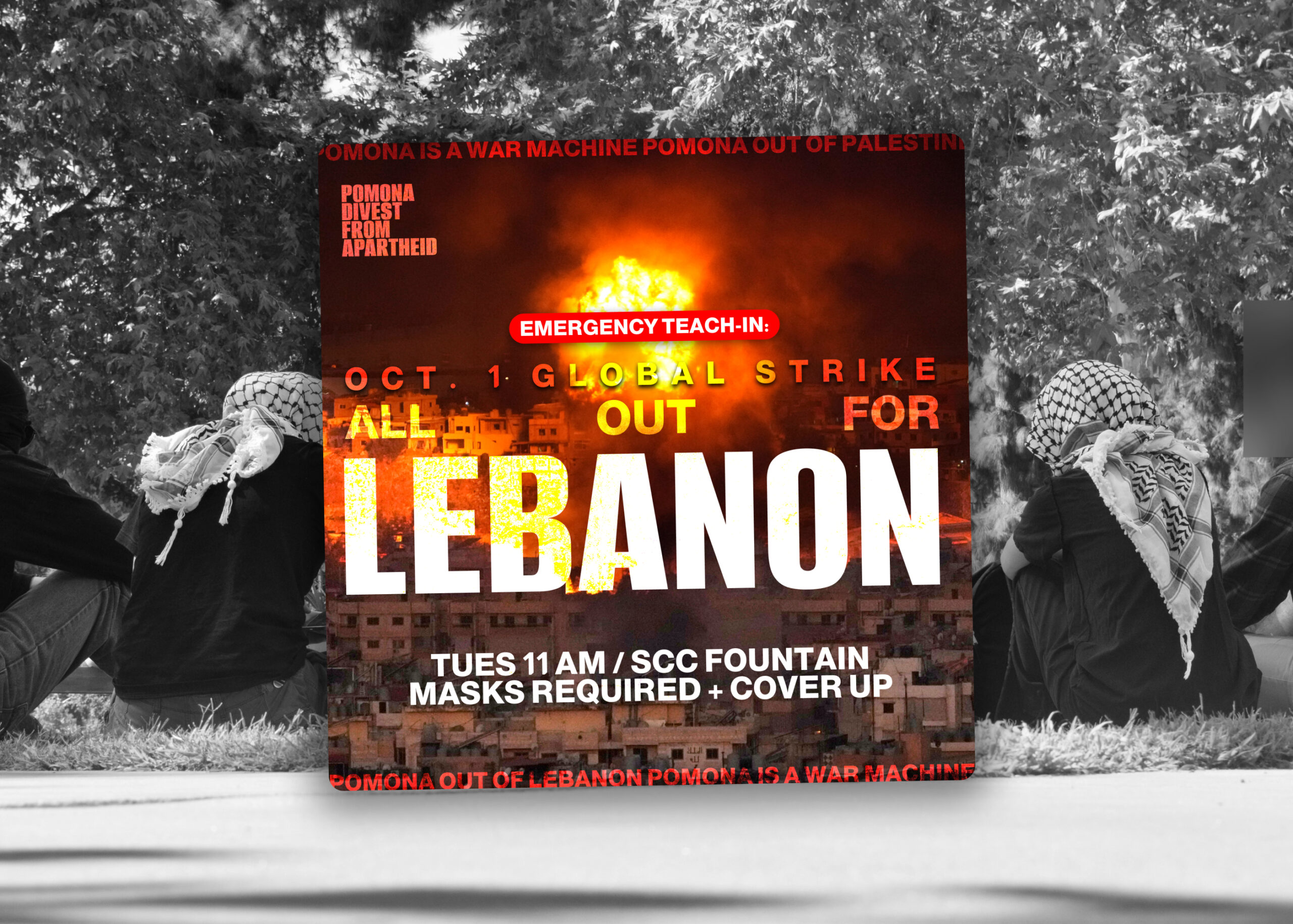
On Oct. 1 Pomona Divest Apartheid facilitated a teach-in on Lebanon and Israel’s history at the SCC that saw 65 attendees, commemorating a “National Day of Action” called for by Palestinian organizers, under the slogan “All out for Lebanon.”
The teach-in came in light of Israeli attacks on Lebanon that wounded at least 9,384 people on Sept. 23. According to Al Jazeera, there were “650 attacks on some 1,600 Hezbollah targets that impacted over forty towns, and forced many to flee the state in search of safety.
This attack comes after an Israeli intelligence agency planted explosives inside thousands of Hezbollah pagers which killed nine people and wounded almost 3,000 others. Pagers that were being used by Hezbollah as a way to avoid Israel’s location-tracking.
The reason for the Sept. 23 attack, according to Israel, is so the state’s displaced citizens can return to northern Israel.
Hezbollah responded to the attacks by firing more than 200 rockets, some of which were directed at Israel’s military bases.
The goal of the teach-in was defined by organizers as informing students on “the relationship between Lebanon and the Zionist entity via Hezbollah,” showing Zionism to be a settler-colonial ideology necessary for the existence of Israel.
The organizers of the teach-in grounded the current escalation in a historical analysis of the relationship between Lebanon and the Zionist entity, tracing its roots to the early days of Zionist settlement in Palestine and the end of World War I. Zionist incursion on Lebanese territory began amidst the imperialist formation of mandate territories. After the dissolution of the Ottoman Empire, the League of Nations granted France a mandate over Lebanon, and Britain a mandate over Palestine. These “mandates” produced artificial borders in the Middle East and granted European powers administrative control, an extension of colonial authority. During this time, the Zionist movement petitioned for the inclusion of the Litani River, a river in south Lebanon, to be within the borders of Mandate Palestine. This attempt was unsuccessful, but revealed the Zionist movement’s early desire to further expand its artificial borders.
Organizers of the teach-in outlined this history by describing the colonial ideology that it falls within:
“In our framing, we understand Zionism is a settler colonial ideology from its beginnings. Like my co-facilitator said here at the beginning, the colony must sustain itself. And whether that be through settlements or exploitation of land or extraction of natural resources, there are patterns to how the Zionist entity has historically treated Lebanon and historically treated Palestine. And that’s because it’s part of its larger colonial project,” said one facilitator.
The 1948 Nakba, the expulsion and murder of Palestinians that precipitated the establishment of the Israeli state, created a mass exodus of Palestinians to surrounding states.
“ [From] 1948 to 1977… a hundred thousand Palestinian refugees fled to Southern Lebanon in 1948. And at a point, that number was over 500,000” an organizer stated.
In 1969, the Palestine Liberation Organization began operating out of south Lebanon, where a large number of Palestinians lived in refugee camps. From there, the PLO continued its political and military campaign for the liberation of Palestine. In 1978, Israeli forces invaded south Lebanon with the goal of eliminating the PLO. In an invasion titled “Operation Litani,” Zionist forces killed 2,000 Lebanese and Palestinians, displaced 250,000 people, and occupied south Lebanon. Israeli forces would withdraw from south Lebanon one month later, passing the torch to the South Lebanon Army as a proxy to carry out its occupation and its effort to eliminate the PLO.
In 1982, the Zionist entity once again invaded Lebanon, carrying out a brutal campaign and besiegement killing 20,000 people and cutting off access to electricity, water, and food.
Organizers noted that “their logic was that eliminating the PLO would mean that they would eliminate all Palestinian resistance.” Adding on that this is “the farthest from the truth.. resistance can never be quelled”
Negotiations facilitated by the United States led to the departure of the PLO to Tunis and formally ended the occupation, beginning the withdrawal of Israeli troops.
However, as organizers put it, “the United States comes in to oversee the withdrawal, but instead continues to occupy south Lebanon and their troops oversee the assault and murder of over 1,000 refugees in the Sabra and Shatila refugee camps,” referring to a gruesome attack that came even after the war against the PLO had supposedly ended
It is within this context that Hezbollah, a Shia militia and political party, arose in 1985, publishing an “Open Letter to the Downtrodden in Lebanon in the World” wherein Hezbollah articulated its aspirations for the liberation of Lebanon and Palestine from Zionist forces. Lebanon was finally formally liberated in 2000. For years, the Zionist entity and Hezbollah exchanged fire and negotiated several political prisoner exchanges.
In 2006, when Hezbollah captured two Israeli soldiers, Israel launched another invasion, with the supposed goal of eliminating Hezbollah’s presence in south Lebanon. During this invasion, Israeli forces murdered over 1,000 Lebanese and displaced hundreds of thousands.
Today, the Lebanese people remain in active solidarity with the Palestinian cause, with frequent protests since the escalation of violence in October 2023. It is this solidarity that so threatens the Zionist entity, leading to the Israeli Pager Attack on September 18th and 19th, 2024 that killed dozens and wounded thousands, and the more recent bombing campaign and invasion that has led to the displacement of one million Lebanese.
Leaders of the teach-in reflected on the material similarities between the Zionist assaults on Lebanon and Palestine, emphasizing that the violence that Israel is inflicting is not new, and it’s not coincidental.
“[Israel is] saying that they’re trying to remove Hezbollah out of Lebanon, but that’s not actually what happened, right? They engaged in the same indiscriminate violence that we see them engaging in today… What they’re doing is.. A blatant disregard for human life.”
At the end of the teach-in, organizers opened it up to students to share their thoughts.
One student shared their thoughts on the connection between law and order and settler colonialism, linking the two to the importance for a state to keep people in line.
“I was really just thinking about the function of law and order and how that is the logic of settler colonialism,” the student said. “It is used to politically cut off each other, this idea that this is a group who is a danger to our social order, a danger to our society, and these are people who do not belong in our society, therefore … they’re deserving of these types of oppressions.”
Another student shared their thoughts on the importance of learning the historical and political context of conflicts, saying that it’s not a coincidence that most people do not ever learn this history.
“I think… a lot of us don’t know the historical and political context, and that’s a reason, there’s a reason for that. Not only were those manmade orders used for geographical reasons, like reasons to extract raw materials from the land, but how do we politically cut out this state from this other state, from this country, from this other country?” they said. “These maps weren’t just created out of nowhere and for us to just lead by them. This was strategically done”
At the end of the conversation, discussion moved from the conflict in Lebanon to Pomona’s management of student activity and protests.
The general sentiment was anger and frustration at Pomona College for the push back that students receive when they mobilize on campus, or have discussions like this teach-in.
One student commented on Pomona’s values are in conflict with its administration’s opposition to practicing the values through direct action.
“I think that there is a culture around this campus where people feel like that it is their place, it’s their place to yap. It is their place to talk about the politics of change, but yet there’s no direct engagement with those practices using those series. And to think about how we can actually bring that into practice.”
Another student added that even showing up to teach-ins challenges Pomona’s desire to keep students “quiet.”
“We are scaring them when we show up in numbers and we make our presence known like we’re doing right now. They want us quiet and they want us unfocused and they want us to just go to class and be good students, even though they can literally take away our studenthood at any time.”
One student closed out the reflections by urging students to continue the conversation and bring more friends and family in.
“I think outside of this conversation and outside of the actions that you all attend, we need to be thinking about this personally with your friends, with your family, with the people that you trust so that you can build that community that you are comfortable with and you are comfortable with bringing those things into practice.”
Organizers closed the presentation with a call for divestment.
“The thesis of this presentation is that Pomona supports settler colonialism in Lebanon and in Palestine through its refusal to divest,” one facilitator said.
Organizers also urged students to continue to get involved with direct actions, like pledge to walkout on Oct. 7, 2024, and also to act in material solidarity through contributions to the People’s Fund, a Claremont Colleges-based mutual aid organization that aims to redistribute wealth to people in Palestine, Sudan and the Congo.
This statement defined their encouragement of students to continue attending knowledge- building discussions and teach-in like this one and their urge to attend to continue to “foster and build community, ” and “find ways to escalate, to strategize.”
This story was published Nov. 2 2024 but was backdated to Oct. 1 for browsing convenience

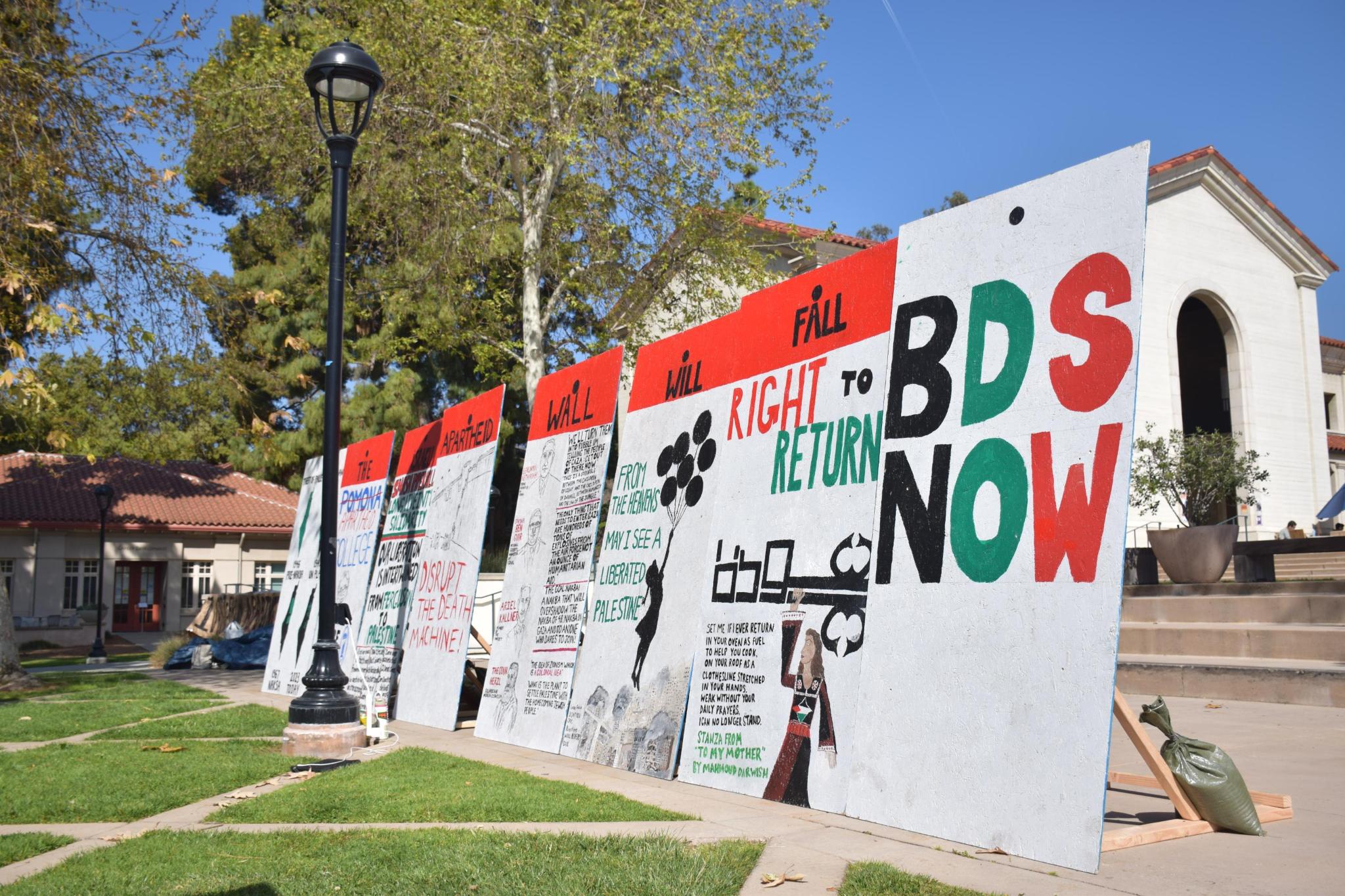
Palestine
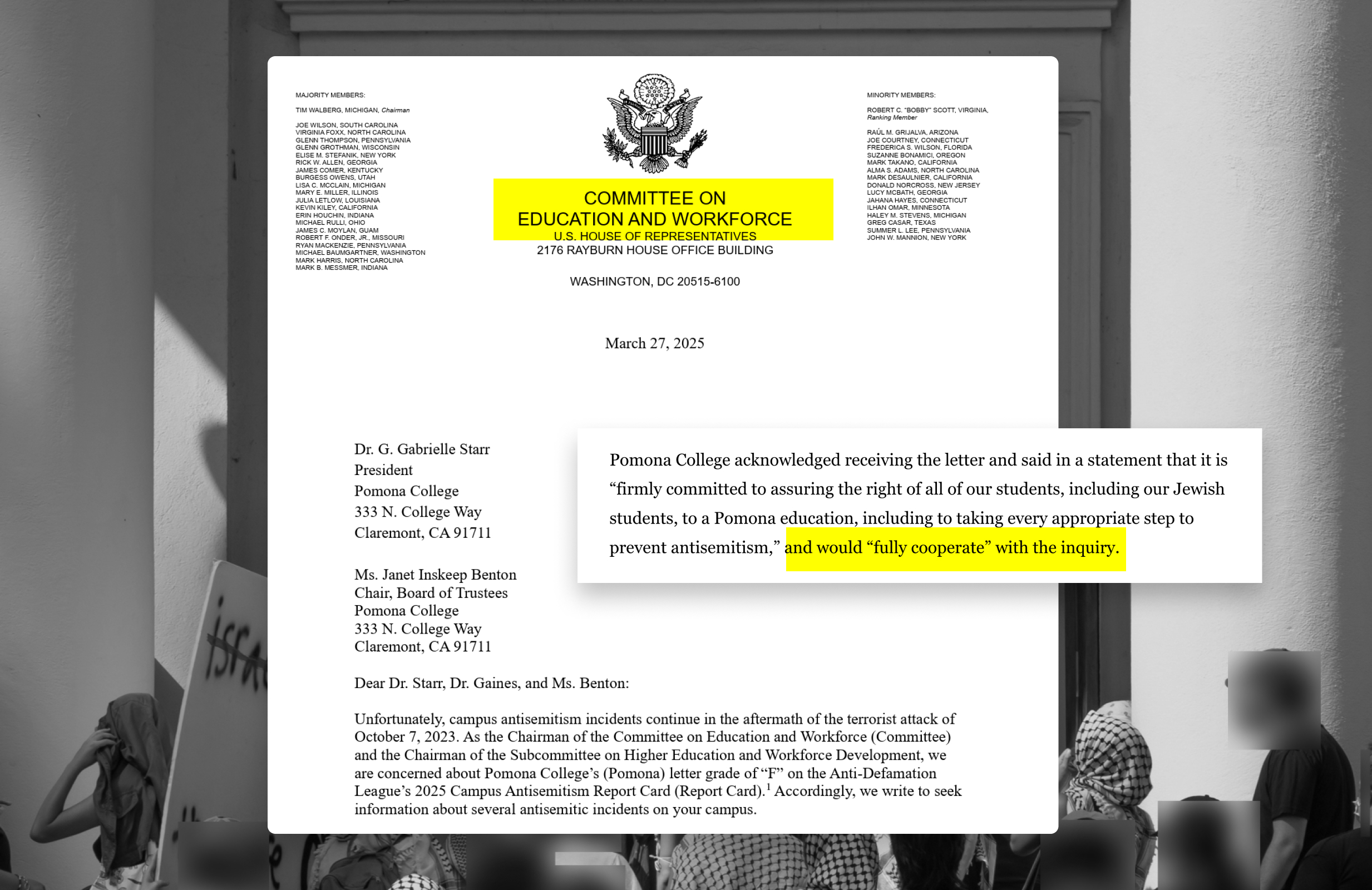
Palestine
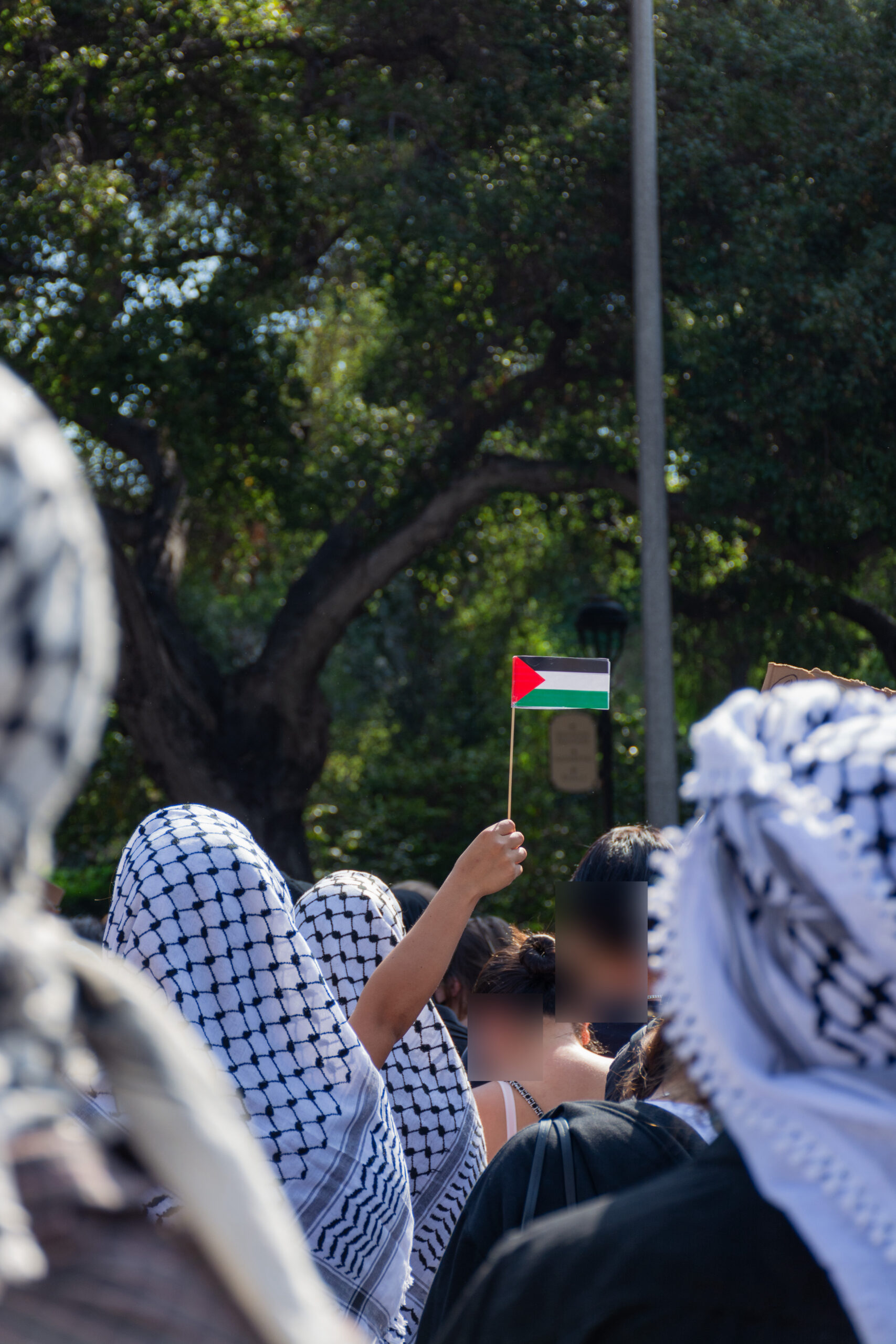
Palestine

Undercurrents reports on labor, Palestine liberation, prison abolition and other community organizing at and around the Claremont Colleges.
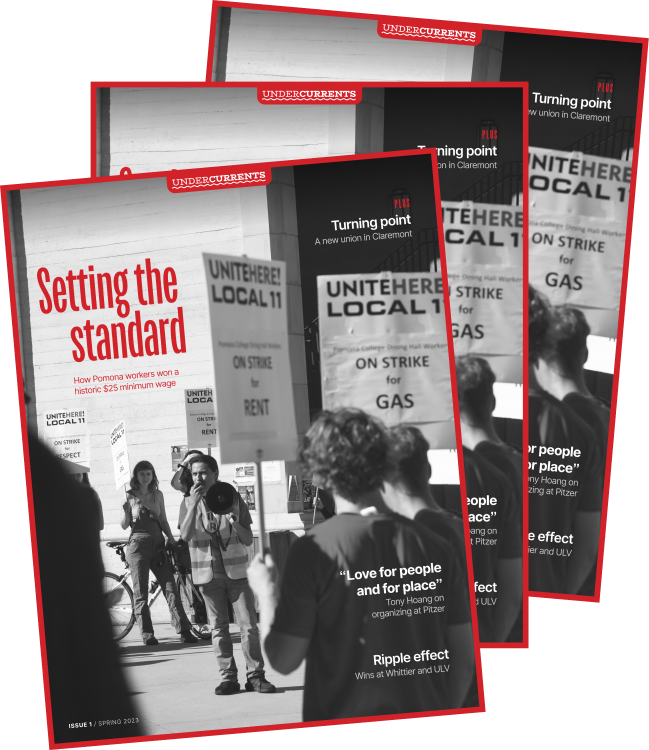
Issue 1 / Spring 2023
Setting the Standard
How Pomona workers won a historic $25 minimum wage; a new union in Claremont; Tony Hoang on organizing
Read issue 1